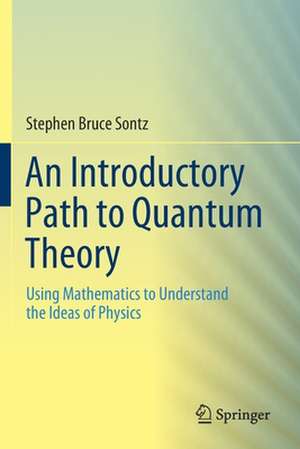An Introductory Path to Quantum Theory: Using Mathematics to Understand the Ideas of Physics
Autor Stephen Bruce Sontzen Limba Engleză Paperback – 17 mar 2021
Since the 17th century, physical theories have been expressed in the language of mathematical equations. This introduction to quantum theory uses that language to enable the reader to comprehend the notoriously non-intuitive ideas of quantum physics.
The mathematical knowledge needed for using this book comes from standard undergraduate mathematics courses and is described in detail in the section Prerequisites. This text is especially aimed at advanced undergraduate and graduate students of mathematics, computer science, engineering and chemistry among other disciplines, provided they have the math background even though lacking preparation in physics. In fact, no previous formal study of physics is assumed.
The mathematical knowledge needed for using this book comes from standard undergraduate mathematics courses and is described in detail in the section Prerequisites. This text is especially aimed at advanced undergraduate and graduate students of mathematics, computer science, engineering and chemistry among other disciplines, provided they have the math background even though lacking preparation in physics. In fact, no previous formal study of physics is assumed.
| Toate formatele și edițiile | Preț | Express |
|---|---|---|
| Paperback (1) | 398.07 lei 3-5 săpt. | +24.57 lei 7-13 zile |
| Springer International Publishing – 17 mar 2021 | 398.07 lei 3-5 săpt. | +24.57 lei 7-13 zile |
| Hardback (1) | 402.62 lei 38-44 zile | |
| Springer International Publishing – 17 mar 2020 | 402.62 lei 38-44 zile |
Preț: 398.07 lei
Nou
Puncte Express: 597
Preț estimativ în valută:
76.19€ • 79.89$ • 62.96£
76.19€ • 79.89$ • 62.96£
Carte disponibilă
Livrare economică 08-22 ianuarie 25
Livrare express 25-31 decembrie pentru 34.56 lei
Preluare comenzi: 021 569.72.76
Specificații
ISBN-13: 9783030407698
ISBN-10: 3030407691
Pagini: 286
Ilustrații: XXV, 286 p. 1 illus.
Dimensiuni: 155 x 235 x 20 mm
Greutate: 0.44 kg
Ediția:1st ed. 2020
Editura: Springer International Publishing
Colecția Springer
Locul publicării:Cham, Switzerland
ISBN-10: 3030407691
Pagini: 286
Ilustrații: XXV, 286 p. 1 illus.
Dimensiuni: 155 x 235 x 20 mm
Greutate: 0.44 kg
Ediția:1st ed. 2020
Editura: Springer International Publishing
Colecția Springer
Locul publicării:Cham, Switzerland
Cuprins
Introduction to this Path.- Viewpoint.- Neither Particle nor Wave.- Schrödinger's Equation.- Operators and Canonical Quantization.- The Harmonic Oscillator.- Interpreting: Mathematics.- Interpreting: Physics.- The Language of Hilbert Space.- Interpreting: Measurement.- The Hydrogen Atom.- Angular Momentum.- The Rotation Group SO(3).- Spin and SU(2).- Bosons and Fermions.- Classical and Quantum Probability.- The Heisenberg Picture.- Uncertainty (Optional).- Speaking of Quantum Theory (Optional).- Complementarity (Optional).- Axioms (Optional).- And Gravity?.- Measure Theory: A Crash Course.
Recenzii
“The target audience is ‘advanced undergraduate mathematics students who had no or only very little prior knowledge of physics’. It would indeed be a rare variety of mathematics advanced undergraduates who would fit this bill. … an interesting supplement for students with a mathematical bent.” (Amitava Raychaudhuri, zbMATH 1458.81002, 2021)
Notă biografică
Stephen Bruce Sontz received a Ph.D. from the University of Virginia with a dissertation in mathematical physics. He has published around 25 research articles in that field as well as two textbooks with Springer. These are "Quantum Principal Bundles, The Classical Case" and "Quantum Principal Bundles, The Quantum Case". He is a research professor at the Centro de Investigación en Matemáticas, A.C. (CIMAT) in Guanajuato, Mexico. He also teaches undergraduate courses in the Mathematics Department of the University of Guanajuato, where he has given courses using the material in this book.
Textul de pe ultima copertă
Since the 17th century, physical theories have been expressed in the language of mathematical equations. This introduction to quantum theory uses that language to enable the reader to comprehend the notoriously non-intuitive ideas of quantum physics.
The mathematical knowledge needed for using this book comes from standard undergraduate mathematics courses and is described in detail in the section Prerequisites. This text is especially aimed at advanced undergraduate and graduate students of mathematics, computer science, engineering and chemistry among other disciplines, provided they have the math background even though lacking preparation in physics. In fact, no previous formal study of physics is assumed.
The mathematical knowledge needed for using this book comes from standard undergraduate mathematics courses and is described in detail in the section Prerequisites. This text is especially aimed at advanced undergraduate and graduate students of mathematics, computer science, engineering and chemistry among other disciplines, provided they have the math background even though lacking preparation in physics. In fact, no previous formal study of physics is assumed.
Caracteristici
Introduction to quantum theory for students with some background in mathematics Basic material can be covered in a one semester course Aimed at advanced undergraduate and graduate students of mathematics, computer science, engineering and chemistry
